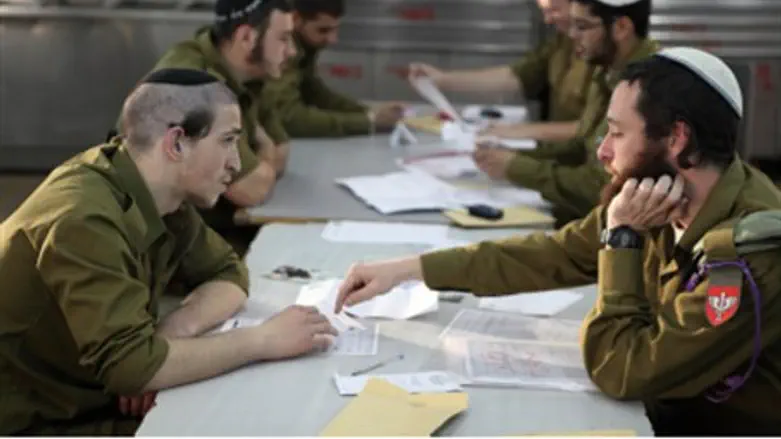
IDF officials said Monday that hareidi soldiers are facing more abuse than ever - not from their peers in the military, but from within their own communities. The harassment is connected to the law that will require hareidi yeshiva students to serve in the IDF.
The statistic, which was revealed during a follow-up meeting in the Knesset Committee for Foreign Affairs and Defense, shows that 136 complaints regarding abuse and harassment have been filed by hareidi soldiers since May 2013. On that month, a committee headed by Science and Technology Minister Ya'akov Peri (Yesh Atid) prepared the for a Knesset vote, making a hareidi draft that much closer to law and sparking unrest within the hareidi world.
Harassment of soldiers from the hareidi sector has become such a problem that a special committee was formed to assess the risks to IDF soldiers living in hareidi communities. Among other things, the committee grants special bus passes for soldiers who cannot return home in uniform. A special hotline has been set up as well to report the incidents. So far, 135 bus passes have been issued, in addition to the special permission given to the entire unit of Nahal Hareidi to travel to and from base in civilian clothing. Other IDF soldiers travel free of charge on buses only when they are wearing uniforms.
Of the 136 complaints, officials stated, 38 were filed by soldiers from hareidi communities in Jerusalem, and 44 by soldiers from Bnei Brak. The complaints cover both verbal assault and physical violence.
Forty-five additional complaints have been filed concerning the rejection of the soldiers or their relatives by educational institutions due to their enlistment. To this end, MK Omer Bar-Lev (Labor) has appealed to the Ministry of Education and the IDF to deal with the institutions, some of which are funded by the State.
Superintendent Avi Rosh, a representative of the police Investigations Division, stated Monday that relatively few complaints are submitted to the police regarding harassment of [hareidi] IDF soldiers. "Twelve complaints were filed in 2013," Rosh noted. "Of those, two were processed through the legal system and two are awaiting indictments. The rest are closed cases or fell apart due to lack of evidence or inability to catch the perpetrators."
Shlomi Abramson, a representative of the Attorney General's Office (AGO), noted that the very first meeting of IDF, police, and legal officials on the subject was held Sunday and that the IDF has never publicly addressed the issue, nor approached the AGO over the complaints.
In response, MK Bar-Lev criticized the lack of coordination between the authorities in an effort to stop the harassment, despite the many incidents of harassment being reported in the media.
Bar-Lev maintained that not only does the problem exist - but that the various authoritative bodies must work together to combat the problem. The MK also called on the IDF itself to not only address complaints when they arise, but to proactively work with hareidi recruits to safeguard their mental and physical health in light of potential threats - not after complaints, but before new incidents occur.